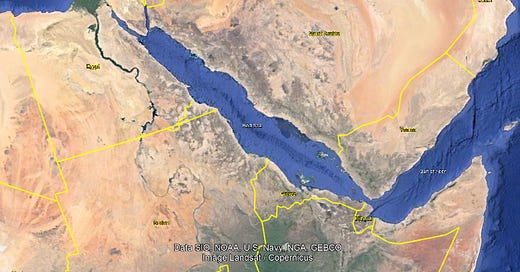Did Saudi Arabia help intercept Iranian munitions targeting Israel?
No, but Israel has every interest in spreading that story.
There is no evidence that Saudi Arabia helped intercept Iranian munitions headed into Israel.
Such action, if it had occurred, would represent a destabilising policy reversal for Saudi Arabia, placing it in conflict with its largest oil client, China, and its most dangerous enemy that it only just reconciled with, Iran and its ally, the Houthi movement.
It would make no strategic sense, as turning against Iran now, when the US and Israel appear weakest, is strategically incoherent.
The website on which the story relies is highly suspect and is not trusted. It most likely is a psychological operation intended to tie together the fates of Saudi Arabia and Israel.
We therefore believe that this story is deliberately fabricated.
The narrative
A website that was reported by Israeli media to be the official website of the Saudi royal family posted a story, first carried in Israeli media, of a source “connected to the Saudi royal family” saying that Saudi Arabia had a system to automatically intercept unidentified objects in its airspace.
This was then interpreted, primarily by Israeli media, as Saudi Arabia confirming that it had joined in intercepting munitions fired by Iran against Israel on 13/14 April, in response to Israel’s 1 April attack on Iran’s Damascus consulate. That interpretation was widely repeated on social media.
We believe this story is fabricated, and not just because the Al Arabiya news channel, which is very close to Saudi authorities, denied it.
The evidence
The crux of the story rests on an anonymous source speaking to Israel’s KAN news website, and a post on a website attributed to the Saudi Royal family which repeated the KAN story. The KAN source, if he exists, may or may not know anything – the Saudi royal family numbers 20,000 people, only a handful of which are of any relevance.
The website in question is not an official website of the family. It is hosted on WordPress and the owner is unknown. Rather, the website seems to have a specific agenda that seeks to maintain some pressure on Saudi Crown Prince Mohammad bin Salman, to push a liberal agenda in Saudi Arabia, to embarrass the royal family, and to appeal to Saudi Arabian citizens’ interests by copy pasting stories about Saudi Arabia and sports.
The website’s English language is poor, but the mistakes in language are not those of typical Arabic speakers nor do they appear to be the result of automatic translation. We have no reason to speculate on where the website originates from or who currently operates it. Suffice it to say that there is no reason to treat this site as official, or as representative of Saudi Arabia’s official viewpoint.
Why would such a story be important?
Given the sensitivity of this section, it is behind a paywall. You may contact me for access if you like.


